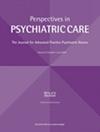Safety Incidents in Psychiatric Inpatient Care: A Qualitative Content Analysis of Safety Incident Reports
IF 1.9
4区 医学
Q2 NURSING
引用次数: 0
Abstract
Introduction. Safety is an essential factor in patient recovery, occupational well-being, and a well-functioning care environment. To identify and understand potential safety risks, information from safety incidents is needed. Aim. To describe safety incidents that occurred on psychiatric inpatient wards. Method. A retrospective register study. The data were collected from a web-based incident reporting database (HaiPro) from six Finnish psychiatric inpatient wards. The incident reports (N = 76) were analysed with descriptive statistics and inductive content analyses. Results. The incidents were verbally or physically aggressive situations, rule violations, or challenges in the ward’s basic activities. The incidents resulted in consequences for patients, personnel, and the wards with varying severity. Some of the incidents could have possibly been prevented with simple, practical measures, such as sharing information, being prepared for safety practices, and having comprehensively planned care. Discussion. Safety incidents cause fear and challenges and could partly be prevented with multiprofessional and multilevel cooperation. Implications for Practice. Preventative actions include multidisciplinary and ward-specific education for safety practices, ensuring resources and not having too many patients on the ward. Multiprofessional communication and mutual understanding, including patient participation, are central. Wards should be designed or renovated so that safe environments can be guaranteed.精神科住院安全事件:安全事件报告的定性内容分析
介绍。安全是患者康复、职业健康和功能良好的护理环境的重要因素。为了识别和了解潜在的安全风险,需要来自安全事件的信息。的目标。描述发生在精神科住院病房的安全事故。方法。回顾性登记研究。数据是从基于网络的事件报告数据库(HaiPro)中收集的,该数据库来自六个芬兰精神病住院病房。对76例事件报告进行描述性统计和归纳性内容分析。结果。这些事件是言语或身体上的攻击性情况,违反规则或挑战病房的基本活动。这些事件对病人、工作人员和病房造成了不同程度的后果。一些事故本可以通过简单、实用的措施来预防,例如共享信息、为安全措施做好准备以及全面规划护理。讨论。安全事故会带来恐惧和挑战,多专业和多层次的合作可以在一定程度上预防安全事故。对实践的启示。预防措施包括多学科和特定病房的安全实践教育,确保资源和病房里没有太多的病人。多专业沟通和相互理解,包括患者参与,是核心。应该设计或翻新病房,以保证安全的环境。
本文章由计算机程序翻译,如有差异,请以英文原文为准。
求助全文
约1分钟内获得全文
求助全文
来源期刊
CiteScore
5.00
自引率
4.30%
发文量
139
审稿时长
>12 weeks
期刊介绍:
Perspectives in Psychiatric Care (PPC) is recognized and respected as THE journal for advanced practice psychiatric nurses. The journal provides advanced practice nurses with current research, clinical application, and knowledge about psychiatric nursing, prescriptive treatment, and education. It publishes peer-reviewed papers that reflect clinical practice issues, psychobiological information, and integrative perspectives that are evidence-based. Perspectives in Psychiatric Care includes regular columns on the biology of mental illness and pharmacology, the art of prescribing, integrative perspectives, and private practice issues.

 求助内容:
求助内容: 应助结果提醒方式:
应助结果提醒方式:


